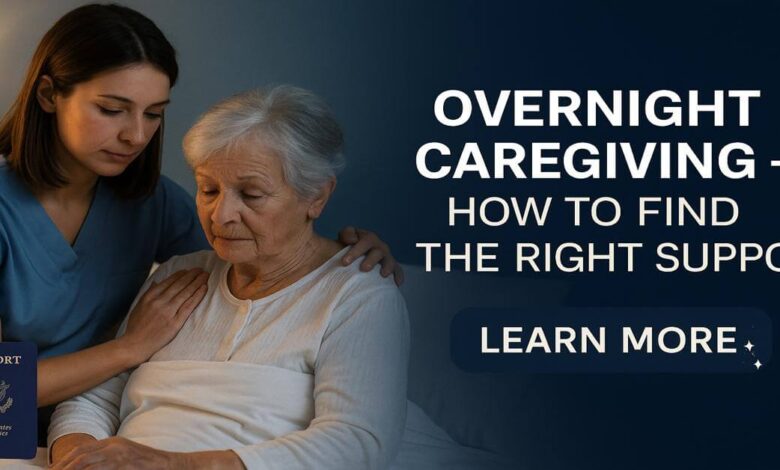
Overnight Caregiving – How to Find the Right Support
As loved ones age or experience chronic health issues, families often find themselves searching for reliable support—especially during nighttime hours. Overnight caregiving offers peace of mind, safety, and professional assistance when it matters most.
But what exactly is overnight caregiving, who needs it, and how can families choose the right solution?
In this article, we’ll explore everything you need to know about overnight caregiving, including its benefits, typical services, cost factors, and how to hire the right caregiver.
What Is Overnight Caregiving?
Overnight caregiving refers to non-medical or medical care provided in a person’s home or care facility during nighttime hours. Typically, this care begins in the evening (around 8–10 PM) and continues until the morning (6–8 AM), offering safety, support, and companionship while family members rest.
Depending on the client’s condition, overnight caregivers may be awake and alert throughout the night or allowed to sleep with periodic check-ins.
Who Needs Overnight Caregiving?
Overnight care may be essential for individuals who:
- Wake frequently during the night due to dementia, incontinence, or medication needs
- Wander or are at risk of falling
- Experience confusion or sundowning (common in Alzheimer’s and dementia)
- Need help using the bathroom or repositioning in bed
- Are recovering from surgery or illness
- Have a disability or chronic condition requiring 24/7 monitoring
Check Also: Florida Relative Caregiver Program – Complete Guide
What Services Do Overnight Caregivers Provide?
Overnight caregivers can assist with:
- Repositioning to prevent bedsores
- Bathroom assistance and incontinence care
- Medication reminders
- Mobility support (e.g., getting in/out of bed)
- Safety supervision (fall prevention, wandering alerts)
- Companionship and emotional reassurance
- Basic housekeeping or laundry (in some arrangements)
- Emergency response and calling for medical help if needed
Benefits:
- Peace of Mind: Families rest easier knowing someone is watching over their loved one.
- Reduced Hospital Visits: Prompt help at night may prevent falls or medical complications.
- Improved Sleep for Clients: Professional caregivers can create a calming routine and manage nighttime needs.
- Family Relief: Prevents caregiver burnout, especially for relatives who work or care during the day.
Cost of Overnight Caregiving:
The cost of overnight caregiving varies depending on location, level of care needed, and whether the caregiver stays awake.
Estimated Costs (U.S. National Average):
| Care Type | Average Rate (Per Night) |
|---|---|
| Sleeping overnight caregiver | $120 – $180 |
| Awake overnight caregiver | $200 – $300+ |
| Live-in 24-hour care | $300 – $500 per day |
Note: Rates can be higher in urban areas or for medically complex cases.
Some families use long-term care insurance, veterans’ benefits, or Medicaid waiver programs to help cover the cost.
How to Find the Right Overnight Caregiver?
Here’s a step-by-step process for hiring an overnight caregiver:
- Assess the Needs
Determine whether your loved one needs someone awake all night or simply available if needed. - Choose the Care Arrangement
Options include:- Hiring independently (private caregiver)
- Using a home care agency
- Arranging for a live-in caregiver
- Interview Carefully
Ask about:- Experience with overnight care or dementia
- Certifications (CNA, HHA)
- Willingness to stay alert through the night
- Background checks and references
- Set Clear Expectations
Document hours, responsibilities, emergency procedures, and compensation. - Start with a Trial Period
A short-term arrangement can help you evaluate fit before committing.
Is Overnight Care the Same as 24-Hour Care?
No. 24-hour care involves two or more caregivers working in shifts to provide continuous attention without sleep breaks. Overnight care typically involves a single caregiver, who may rest if permitted and depending on the level of care required.
Conclusion:
Overnight caregiving is a crucial service that enhances safety, independence, and comfort for seniors and individuals with medical needs. Whether your loved one lives alone, is recovering from surgery, or has dementia, the right overnight caregiver can make a meaningful difference in their well-being—and your peace of mind.
Frequently Asked Questions:
What are the types of overnight care services?
Sleeping night care: The caregiver is present but only intervenes if needed (e.g., once or twice a night).
Waking night care: The caregiver stays awake and actively monitors the person throughout the night.Can I hire a live-in caregiver instead of overnight-only support?
Yes. If continuous support is needed both day and night, live-in care may be more efficient and cost-effective long-term. Some families combine daytime and overnight shifts through agencies.
What is overnight caregiving?
Overnight caregiving involves a professional caregiver staying in the home during nighttime hours to assist individuals who may need help with mobility, toileting, medication, or reassurance during the night.




